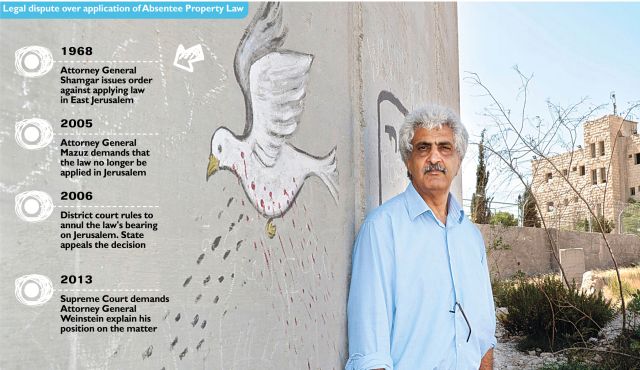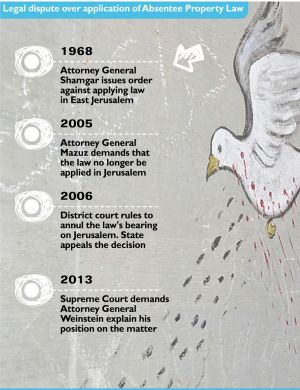Supreme Court orders Israel's AG to explain law allowing confiscation of Palestinian land in Jerusalem
 Wednesday, May 22, 2013 at 10:19AM
Wednesday, May 22, 2013 at 10:19AM Critics say the law, passed soon after Israel was founded to claim the property of Palestinian refugees, is now used to unjustly seize property at the edge of Jerusalem.
by Nir Hasson Haaretz 22 May 2013

Ali Iyad, with the Cliff Hotel in the background. Photo by JC Torda
The Supreme Court on Monday discussed a controversial law that allows the state to confiscate "absentee" property in Israel, a ruling which critics say allows the state to appropriate land and buildings belonging to Palestinian residents of Jerusalem who were unlucky enough to live on the wrong side of the municipal boundaries following the Six-Day War.
At least two attorneys general and a district court judge have over the years come out against the law. The hearing on Monday came after the state appealed to the Supreme Court to vacate a district court’s ruling that the law not be applied in Jerusalem.
In an unusual step, an expanded bench of seven justices headed by Supreme Court President Asher Grunis asked Attorney General Yehuda Weinstein to appear personally to explain the state’s position.

Attorney Avigdor Feldman said during the hearing that according to the letter of the law, even an Israeli settler who lives in the West Bank and has property in Israel is considered an absentee and so has to worry about the state confiscating his property.
The purpose of the Absentee Property Law, passed in 1950, was to take possession of property in Israel that belonged to Palestinian refugees. According to the law, any person present in an enemy country or outside Israel is considered an absentee, and his property goes to the Custodian of Absentee Property, today a body within the Justice Ministry.
After the Six-Day War, residents of the occupied territories who held property in Jerusalem found they had been deemed absentees without ever leaving their homes. The Iyad family from Abu Dis, for example, owned the Cliff Hotel, which is 200 meters from their home. Because the municipal boundary runs between their home and the hotel, the custodian in 2003 declared them absentees and transferred the hotel to the state’s ownership. The hotel now stands deserted.
In another example, a family, represented in Monday’s hearing by attorney Sami Arshid, lives in an older part of the Beit Hanina neighborhood, located in the West Bank, but owns property in a newer part of the neighborhood, only a few hundred meters away, within Jerusalem’s boundaries. The family’s Jerusalem home was taken by the state.
Over the years, the Absentee Property Law has become a tool for right-wing groups seeking to increase the Jewish presence in East Jerusalem. These groups ask the custodian to expropriate houses whose residents are in the West Bank and then rent the premises from the custodian, usually for a nominal fee. That is how many of the Jewish settlements in Palestinian neighborhoods in Jerusalem came into being.
Many judicial officials view the application of this law in Jerusalem as morally and legally problematic, because unlike Palestinians who fled the country during war to countries at war with Israel, the Palestinian property owners in these and many other cases are under Israeli military rule in the West Bank and sometimes live only a few meters from the home that has been taken from them.
Although in 1968, then-Attorney General Meir Shamgar ordered that the law not be applied to East Jerusalem, with the establishment of the Likud government in 1977, the law came back into force. The pendulum swung back again in 1992, under then-Prime Minister Yitzhak Rabin, but in 1997, restrictions on the law’s application were once again loosened, and in 2004, under then-Prime Minister Ariel Sharon, the cabinet decided, against the advice of the attorney general, to restore all the custodian’s powers with regard to property in Jerusalem.
In 2005, then-Attorney General Menahem Mazuz ordered that the law not be applied due to “its many legal difficulties” involving “the obligations of the State of Israel to international judicial rules and customs.”
In 2006, then-District Court Judge Boaz Okun also ordered the law not be applied in Jerusalem, but at the end of that year, the state appealed Okun’s ruling. Among the state’s claims was that the Palestinian Authority is a foreign political entity and therefore residents of the territories are absentees.
At Monday’s hearing, the justices suggested to representatives of the Palestinian families whose property had been taken that they apply to the custodian’s committee to have the expropriations reversed. The representatives refused, saying that doing so would recognize the legality of the custodian’s actions.
The justices are to make a ruling at a later date.
----------------------------------------------------------------------------------------------------------------------
Israel's AG: Absentee properties in East Jerusalem can be confiscated
By Nir Hasson | Jun.05, 2013 | 4:10 AM | ![]() 39
39
Decision markes reversal of Yehidah Weinsteins' predecessor
A law allowing Israel to confiscate "absentee" properties may continue to be applied to Palestinian homes in East Jerusalem, Attorney General Yehuda Weinstein said in a legal opinion.
Weinstein's opinion goes against the decisions of his predecessors, including Meir Shamgar, who said as far back as 1968 that the Absentee Property Law should not be applied in Jerusalem, and Menachem Mazuz, who served as attorney general immediately before Weinstein.
According to the law, which was passed in 1950, any person living in an enemy state or outside Israel is considered an absentee, and his property goes to the Custodian of Absentee Property, today a body within the Justice Ministry.After the 1967 Six-Day War, residents of the occupied territories who held property in Jerusalem found they had been deemed absentees without ever leaving their homes.
The decision over the application of the law in East Jerusalem has significant implications for Jewish settlement in the city's predominantly Palestinian neighborhoods. Over the years, the Absentee Property Law has become a tool for right-wing groups seeking to increase the Jewish presence inEast Jerusalem. These groups ask the custodian to expropriate houses whose residents are in the West Bank and then rent the premises from the custodian, usually for a nominal fee.
The Iyad family from the Palestinian town of Abu Dis, for example, owned the Cliff Hotel, which is 200 meters from their home. Because the Jerusalem municipal boundary runs between their home and the hotel, the custodian in 2003 declared them absentees and transferred the hotel to the state’s ownership. The hotel now stands deserted.
In another example, a family, represented in Monday’s hearing by attorney Sami Arshid, lives in an older part of the Beit Hanina neighborhood, located in the West Bank, but owns property in a newer part of the neighborhood, only a few hundred meters away, within Jerusalem’s boundaries. The family’s Jerusalem home was taken by the state.
Although in 1968, Shamgar, then the attorney general and later a Supreme Court justice, ordered that the law not be applied to East Jerusalem, with the establishment of the Likud government in 1977, the law came back into force. The pendulum swung back again in 1992, under then-Prime Minister Yitzhak Rabin, but in 1997, restrictions on the law’s application were once again loosened, and in 2004, under then-Prime Minister Ariel Sharon, the cabinet decided, against the position advocated by the Justice Ministry, to restore all the custodian’s powers with regard to property in Jerusalem.
In 2005, Mazuz wrote a sharply worded letter as attorney general ordering that the law not be applied in Jerusalem. "The application of the powers of the Custodian of Absentee Property to properties in East Jerusalem raises many serious legal difficulties regarding the application of the law and the reasonableness of its decision, and … the obligations of the State of Israel toward the traditional principles of international law," he said.
In 2006, then-District Court Judge Boaz Okun also ordered the law not be applied in Jerusalem, but at the end of that year, the state appealed Okun’s rulingto the Supreme Court.
Two weeks ago, an expanded bench of Supreme Court justices held a hearing regarding an appeal of four cases in which East Jerusalem properties belonging to residents of the Palestinian territories were confiscated based on the Absentee Property Law. During the hearing, the justices ordered Weinstein to appear before them in person to explain his position. On Tuesday, the state prosecutor informed the court that the attorney general had approved the application of the law in Jerusalem.
"[Guidance} was sought from the attorney general on the topic, and it was decided that the indeed the legal status was that the properties located in East Jerusalem, with their owners residents of the Judea and Samaria region, were absentee properties," the state prosecutor said. "This the language of the law and the ruling of the High Court of Justice show."
Nevertheless, the attorney general said the four cases that reached the Supreme Court should be referred to a special committee that operates based on the Absentee Property Law to examine the possibility of releasing the properties from the hands of the custodian and returning them to their original owners. The Palestinian plaintiffs objected to this solution, because it would entail legal recognition of the confiscation of their properties and require the filing of special requests to have them released.
The state prosecutor announced the entire issue will be brought to the attention of the political echelon. The next Supreme Court hearing is scheduled for this September, when Weinstein will be expected to appear.
---------------------------------------------------------------------------------------------------------
 APJP |
APJP |  Post a Comment |
Post a Comment |
Reader Comments